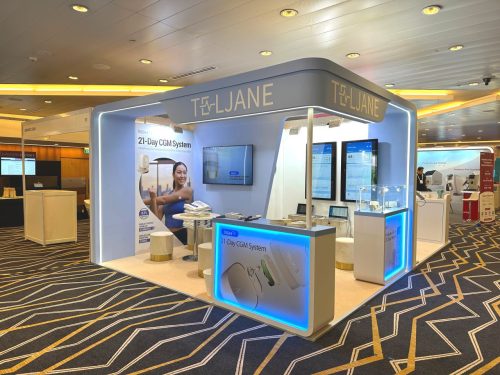Driving the transition toward dynamic, precise, and normalized diabetes management
Continuous Glucose Monitoring (CGM) technology is reshaping diabetes care worldwide—shifting from intermittent, static blood glucose checks to continuous, dynamic, and intelligent monitoring. The latest international guidelines and major academic conferences have highlighted CGM’s expanding value, refined clinical indicators, and AI-enabled innovation in diabetes management.
1. Trends in Global Clinical Guidelines
ADA 2025 Recommendations
- CGM is recommended not only for insulin-treated patients but also for non-insulin-treated type 2 diabetes and high-risk populations
- Dynamic glucose metrics are incorporated into routine clinical evaluation:
- TIR (Time in Range)
- TITR (Time in Tighter Range)
- CV (Coefficient of Variation)
- Early detection and personalized disease-risk profiling are emphasized
EASD and Chinese Expert Consensus
- Advocates for “precision, entire-course, and closed-loop” glucose management
- TITR recommended for patients aiming close-to-normal glycemic targets
- Strong focus on behavioral change, adherence, and psychological improvement
Real-world evidence confirms:
- Significant improvements in HbA1c and TIR for non-insulin T2DM users
- Reduced risk of hypoglycemia and diabetes-related distress
- Better long-term healthy habits and disease ownership
2. Latest Insights from ADA & EASD 2025 Conferences
- CGM benefits validated in self-management, including dietary behavior, activity planning, and psychological relief
- Digital diabetes platforms show a dose–response relationship: More active engagement → Better outcomes
- Stronger evidence connecting TIR, TITR, HbA1c, and CV for clinical decision-making
- AI-enhanced care models emerging:
- Automated interpretation
- Cloud-based coaching
- Proactive risk detection
3. Advances in CGM Technology & Accuracy
- From finger-stick calibrations → Factory-calibrated sensors
- From short lifespan → Up to 21-day wearable duration
- From wired download → Wireless Bluetooth + cloud synchronization
- From raw readings → Accurate trend prediction and hypoglycemia detection
iCGM standards raise the bar in:
| Capability | Clinical Impact |
|---|---|
| Higher analytical accuracy | Safer, more reliable decision-making |
| Advanced trend analytics | Stronger hypoglycemia protection |
| Broader usability | ICU, neonates, elderly, special populations |
4. Standardization Challenges & Global Evolution
Current regulatory standards (e.g., FDA, POCT-related standards) rely on capillary blood glucose accuracy,
yet interstitial glucose differs and exhibits lag.
Emerging global direction:
| Transformation | Goal |
|---|---|
| Multi-metric accuracy assessment | Real-world medical relevance |
| Dynamic rate-of-change evaluation | Better detection of dangerous events |
| System-level evaluation (sensor + algorithm + UX) | True-to-life usability & safety |
A new set of clinically aligned CGM evaluation tools is taking shape—bridging the gap between technical specs and clinical reality.
5. TIR & Related Metrics as Core of Precision Care
| Metric | Definition | Clinical Relevance |
|---|---|---|
| TIR | % of time 70–180 mg/dL | Strong correlation with complications |
| TITR | % of time 70–140 mg/dL | For near-normoglycemia goals |
| CV | Glycemic variability | Strong indicator of hypoglycemia risk |
CGM is no longer just “more data” —
It is a precision decision engine for medication and lifestyle intervention.
6. AI-Enabled Intelligent Glucose Management
Key future directions:
- AI-driven analytics for real-time clinical insights
- Integration into automated insulin pump closed-loop systems
- Multi-biomarker monitoring (ketones, lactate, etc.)
- Wider population coverage:
- Seniors
- ICU and special-care settings
- Pregnancy / GDM
- Athletes
- Individuals with metabolic-health risk
CGM is expanding from disease therapy to preventive metabolic health management
7. Conclusion: CGM Becoming a New Standard of Diabetes Care
- Clinical guidelines → broader patient eligibility
- Regulatory evolution → higher expectations for precision & safety
- AI integration → actionable, personalized insights
CGM = See more + See accurately + Apply widely + Interpret intelligently
A smarter, safer, and more proactive future of diabetes care is rapidly arriving.












